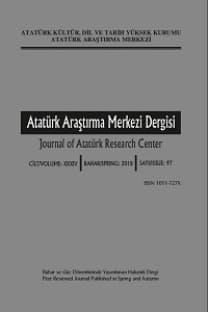Atatürk’ün Din Ve Lâiklik Anlayışı
Atatürk, bir siyaset dehası olarak, Türkiye için bu ilkelerin gerekliliğini, birlik ve bütünlük açısından zorunluluğunu anlamış ve bu nedenle uygulama safhasına koymuştu. Yoğun bir tarih bilgisine sahip olan Atatürk, Türkiye tarihinin kendine özgü şartlarından hareketle, gerçekte batı kaynaklı olan bu kavramlara yeni anlamlar vermiş ve bu kavramları Türk Milleti'nin öz değeri haline getirmiştir. Lâiklik kavramının, toplum yaşamında egemenliğini uzun süredir sürdürmüş olan din ve dinle ilgili kavramlara yeni statüler oluşturması zorunluluğu ortaya çıkmıştır. Bu yeni statü, dinin çağdaş anlamda yorumlanması gibi pratik bir kolaylığı getirerek, dini toplumsal gelişmenin bir aracı haline sokmuştur. Bu durum, Türk Ulusu'nun çağdaşlaşması sürecinin en önemli halkasını oluşturur.
Anahtar Kelimeler:
Atatürk, Din anlayışı, çağdaş toplum, laiklik
The object of this article is to expose and analyse the gradual stages in the implementation process of Britain's defence policies in the Middle East after the Second World War, taking into account the impact of these policies on Turkey. Britain was concemed about the future of her bilateral defence agreements with local States, as the people of the region were struggling to free themselves from British colonial dependence. In addition, growing Soviet threats towards the region were a cause of concern. Britain's economic and financial difficulties in this period also had negative effects on her projected defence policies in the region. In order to overcome these difficulties Britain tried to secure the United States' cooperation. The article is based on archival material-British and American- as well as secondary sources in English and Turkish
Keywords:
Britain, Turkey, Middle East,
___
- Kuban, Doğan, "Atatürkçülük Üzerine Yorumlar".
- Kılıç, Ali, Atatürk'ün Hususiyetleri, Tarihsiz.
- Gürtaş, Ahmet, Atatürk ve Din Eğitimi, Ankara, Tarihsiz.
- İnan, Afet, Medeni Bilgiler, Türk Tarih Kurumu,1988.
- Türkiye Cumhuriyet Anayasası,1982.
- Atatürk'ün Söylev ve Demeçleri, ATAM Yayınları, Cilt II, 1997.
- ISSN: 1011-727X
- Yayın Aralığı: Yılda 2 Sayı
- Başlangıç: 1984
- Yayıncı: Atatürk Kültür, Dil ve Tarih Yüksek Kurumu Atatürk Araştırma Merkezi
Sayıdaki Diğer Makaleler
Doğu Meselesi Ve Milli Mücadele'de Osmaniye
Mustafa Kemal Atatürk'ten Bir Amerikalı Çocuğa - Curtis La France
Türkiye Cumhuriyeti’nde 75 Yılda Neler Yapılmıştır, Neler Yapılmalıdır?
Amasya Protokolü Ve Osmanlı Hükümetleri
Cumhuriyetin 75. Yılında Tarihsel Süreç İçinde Türk Kadınının Dünü Ve Bugünü
Cumhuriyetin Oluşumunda Atatürk Ve Sonrası
